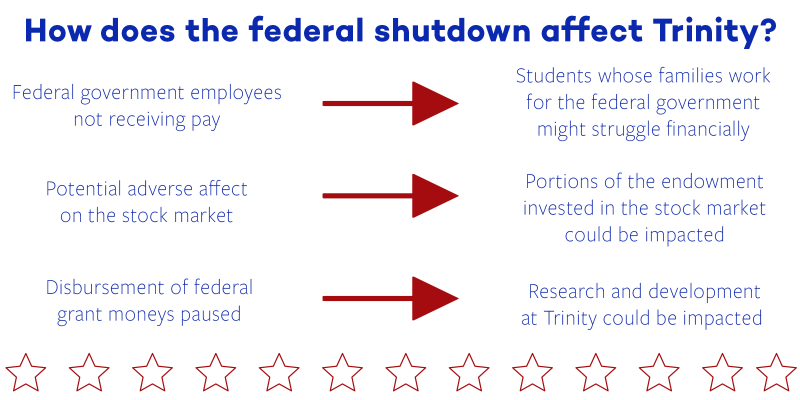While the United States Congress and president battle it out on Capitol Hill, Trinity University faces possible issues caused by the government shutdown.
The federal government has been in a partial shutdown since Dec. 22 of last year. According to David Macpherson, professor of economics, this particular government shutdown is the consequence of disagreement over the creation of a border wall between Mexico and the United States. Congress and the president have been unable to compromise on the funding of the wall.
“They’re fighting over a very small percentage of the budget. Way less than one percent. We spend thousands of billions of dollars in a year, so it’s a really tiny [percentage],” Macpherson said. “I think it’s symbolic. He wants to say, ‘I got a wall,’ and Democrats don’t want to give him the wall.”
During a shutdown, certain federal agencies do not receive funding, and the people working for these agencies are not paid. Some federal employees whose jobs are deemed necessary to the protection of life and property are working without pay until the shutdown ends, while others are furloughed and not working at all. While all federal workers will receive pay retroactively once the shutdown ends, the government is not currently compensating these staffers.
“If you are someone who works for the government, you won’t get paid. Which means you can’t pay bills, you can’t buy food, you can’t pay the mortgage,” said David Crockett, chair and professor of political science. “Any student here whose parents work for the federal government might find themselves financially strapped.”
According to Crockett, the longer the shutdown continues, the more trouble parents may have in paying for school.
“As a university, we’re always concerned about the well-being of students and the well-being of faculty and staff. Faculty and staff are getting paid,” said David Ribble, associate vice president for Academic Affairs. “We are worried that if there’s families at Trinity whose parents work for the government, what that impact might be. It’s difficult to gauge.”
Trinity University is funded mainly by tuition and the endowment. Portions of the endowment are invested in the stock market, which could be affected by the shutdown.
“To the extent that this lingers and has an adverse impact on the stock market and growth, that could impact our endowment. We want our investments to be healthy, and it could have an impact on that,” Crockett said.
Trinity spends about $3.5 million a year on research and most of that money comes from federal agencies through grants.
“There are disbursements of those grant moneys that have come to a halt. It’s really not that big of a deal right now, but it is an impact that we’re having to keep an eye on,” Ribble said. “It’s hard for me to imagine that that would ever [completely] come to a halt. If there’s a shortfall through the government shutdown, I think we should be able to cover it. I don’t think there’s going to be any big panics on those things.”
For a shutdown to end, the House of Representatives and Senate must agree on a spending bill. Once that happens, the bill is sent to the Oval Office, where the president can either sign it into law or veto it. From there, the two houses of Congress can either bypass the president’s veto with a two-thirds majority vote in both houses or simply start the process over in the hopes of crafting a bill that both Congress and the president can agree on.
“That’s really hard to do when you’ve got a slight edge for the Democrats in the House, and a slight edge for the Republicans in the Senate. Somebody’s got to cave,” Macpherson said. “I was up in Washington two days ago, and I was talking to congressional staffers, and they were saying that they don’t see any end in sight.”
Once a compromise is reached and a budget is passed, the economy should realign itself as federal workers will be compensated, according to John Huston, professor of economics.
“If it ends soon, I think the effects will be small. The longer it goes on though, the bigger the effects become,” Huston said. “The indirect effects could be large.”







